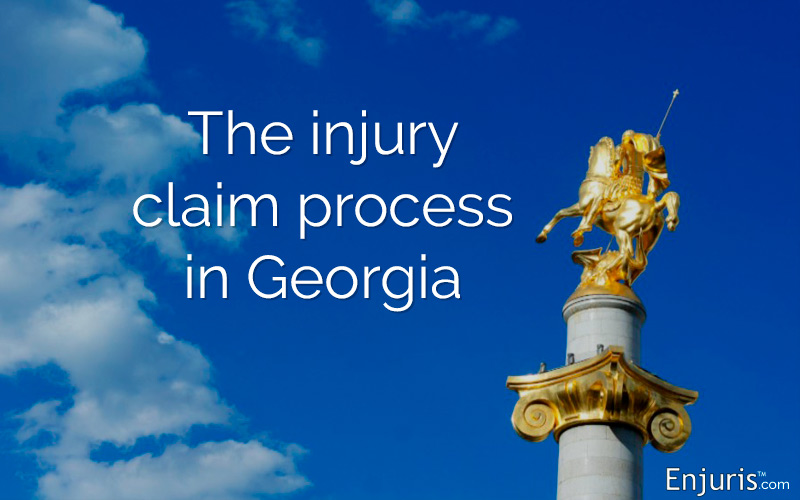A quick overview of the steps every accident case in Georgia goes through
Statutes surrounding personal injury accidents are different in each state. If you’ve been injured in Georgia, you want to make sure you understand which laws apply to your situation.
The Peach State’s claims process has many variations in its laws, meaning that hiring a personal injury attorney is a good idea.
If you’ve been hurt, the statute of limitations is two years to file a lawsuit – though this time limit is shortened to one year if the claim is against the government. There are additional stipulations for suing towns, counties or municipalities.
If you fail to file your lawsuit within that time window, your case will likely be dismissed unless there are extenuating circumstances, like the late diagnosis of cancer that couldn’t possibly have been discovered earlier.
8 Steps for Personal Injury Cases in GA
Proceeding through the legal process is challenging, particularly if you don’t know the laws and limitations that apply to personal injury claims in your state. Most people require the help of a knowledgeable and experienced attorney to help ensure that everything is done correctly.
Every case is different, which is why having a legal expert on your side can be a life saver. However, there are some general steps that most injury cases go through in Georgia.
1. Get medical attention
Don’t wait until you get home after a car accident or other type of incident; see a doctor immediately. Go to the emergency room if you must. You have a legal responsibility to mitigate your own injuries, meaning if you didn’t seek medical attention when it would have helped you, that can harm your case down the road. Make sure you get copies of every invoice, bill and copay, and store them in a safe place (more on this later). There are plenty of resources available for physical and emotional recovery.
2. Hire a good lawyer
Georgia has many local and statewide rules that must be followed, so you should work with an expert who is familiar with your state’s laws, who can assess your options, who knows the local players, and who has lots of experience.
If you haven’t started your legal search yet, check out our list of Georgia attorneys in the Enjuris law firm directory. Here’s a list of questions to ask when conducting interviews, and a preparation sheet to assist you in preparing for your first meeting.
Make sure to shop around! You should be comfortable with whomever you choose, because you may be working with them for a while.
3. Notify your insurance company
Georgia is a fault state, like the majority of the others. This means that in the event of an accident, the at-fault driver and his or her insurance company are liable for the victim’s medical bills, property damage and more.
Georgia follows the “modified comparative fault” theory, meaning each individual party is assigned a percentage of the blame for the incident in question. It’s rarer than you think that someone is 100% at fault or 100% innocent. However, if a plaintiff is more than 50% responsible for causing the accident, then recovery will be barred.
You will want to put your insurance company on notice that an accident occurred and you’ve suffered injuries or property damage. An attorney can do this for you, which allows you to put off any recorded statements with your insurer until you’ve had time to speak about your case with your lawyer.
4. Start a post-accident diary
A post-accident journal is a valuable part of your healing process and will allow you to see your progress. Keep track of invoices, medical bills, expenses, doctors’ appointments, and impressions of the accident. The period after an accident is a whirlwind of tasks to get done, and time can meld together. Write down details of your injuries, medical treatments, medication regimen and other important aspects of your care for future reference.

Sample accident journal/diary to help you document the effect on your daily life
Download in PDF format
Keeping a post-accident journal allows your attorney and any insurance adjusters to see the accident from your perspective.
5. Write down all expenses
When you begin medical treatment after an accident, you will find that you suddenly have lots of paperwork to keep track of: bills, medical exams, doctors’ notes, invoices, copays, etc. Some of these documents will be hard copies, and others will be electronic. Don’t let any of them slip through the cracks because these might play an important role in your case. Consider starting a damages and expenses worksheet.

Damages worksheet to track expenses for your injury claim (medical treatment, property damage, lost wages, prescriptions)
Download in PDF format
You might also try keeping an electronic journal, such as an Excel spreadsheet, and use that in tandem with a designated folder on your computer. Scan any hard copies and keep them all in one spot.
When you meet with your attorney, make sure everything is neat and organized. You might want to check against this list of important documents that you should bring to your first appointment with your lawyer.
6. Draft a demand letter
Your lawyer will likely be the one to draft a demand letter and send it to your insurance company. These documents typically include important details like how and where the accident happened, medical bills, lost wages, receipts, expenses, and the demand for compensation. Most demand letters include a time limit within which the insurer must respond (generally 30 days).
7. Negotiate a settlement
The insurance company might decide they want to play hardball and refuse to settle, or they might cave to your demand letter. If you cannot reach an agreement or resolve the matter through alternative dispute resolution, the parties will proceed to trial.
According to the U.S. Department of Justice, only 4 - 5% of personal injury cases go to trial. Nearly 95 - 96% of injury claims are settled pretrial.
8. Maybe move on to a trial
If settlement negotiation fails, your lawyer will prepare a legal complaint, much like the demand letter, that outlines what happened during the accident, the expenses you have incurred, and what you demand as compensation. This will usually be filed in the local court where the accident occurred. A copy of this will need to be served to the defendant, who then has time to formulate a defense and hire an attorney of their own.
After this, both parties move into the discovery phase, which is when you and your attorney request information from the opposing side. Documents and witnesses are identified, and both the plaintiff (AKA the victim) and the defendant will submit what they plan to bring as evidence during a court trial.
The respective attorneys will also present legal motions such as a motion to dismiss or request the judge to rule over certain aspects of the case. Once discovery has been completed and motions have been decided, a date will be set for the trial.
To establish negligence in court, you must show that the defendant owed you a duty of care, that this duty was breached, and this resulted in you accruing damages or personal injuries.
At the trial, both sides have the chance to present their side of the case, introduce supporting evidence, and question witnesses in front of a judge or jury. It’s the jury’s job (or in a bench trial, the judge’s job) to determine whether the defendant is liable, and if so, what is appropriate to award as compensation. As damage caps for pain in suffering in medical malpractice cases were declared unconstitutional by the Georgia Supreme Court, those will not affect the award you might receive.
If either side doesn’t like the result, they’re free to file an appeal. Appeal are generally granted when they focus more on procedural errors or possible violations made during the first trial.
How long does a settlement or trial take in Georgia?
There’s no clear answer to this. Really, there are so many variables.
How Long Will My Injury Claim Take?
View Full Size Get the Code Use this graphic on your site
Use this infographic on your site
We encourage people to use our infographics, with proper attribution. Just copy and paste the code below to use this infographic on your site. If you need help, let us know!
<a href="https://www.enjuris.com/personal-injury-law/injury-claim-process-timing/" target="blank"><img src="https://www.enjuris.com/infographics/how-long-will-injury-claim-take.jpg" alt="How long does a personal injury claim take? Personal Injury Basics - Timing" title="How long will my injury claim take? The process and timing" style="width: 100%; max-width: 800px; display: block; margin: 15px auto;" /></a>
If you reach a settlement, or if a judge or jury awards you damages, then you’ve finally reached the end – unless, of course, either side decides to appeal. Otherwise, you’re done!
See our guide Choosing a personal injury attorney.



